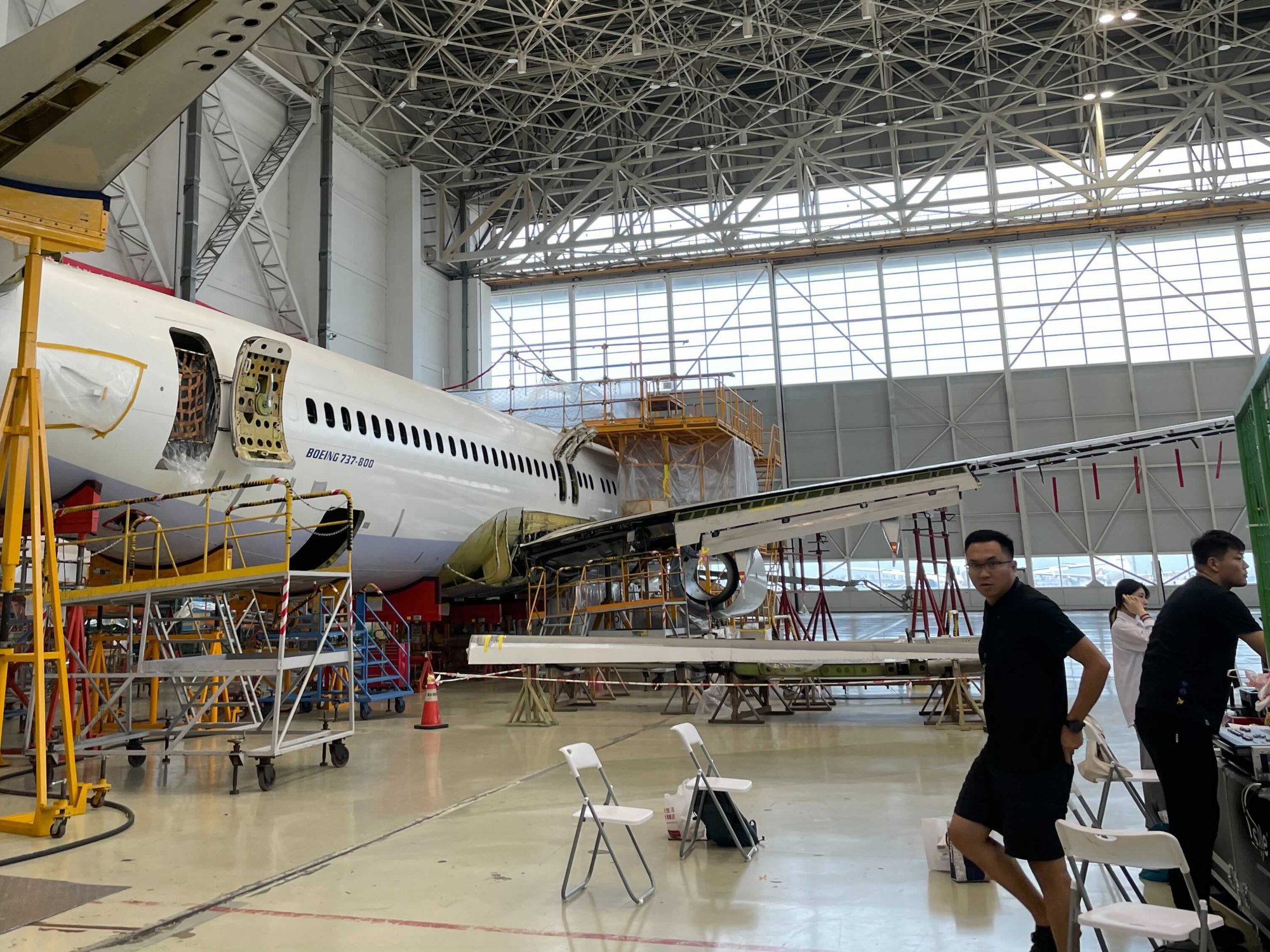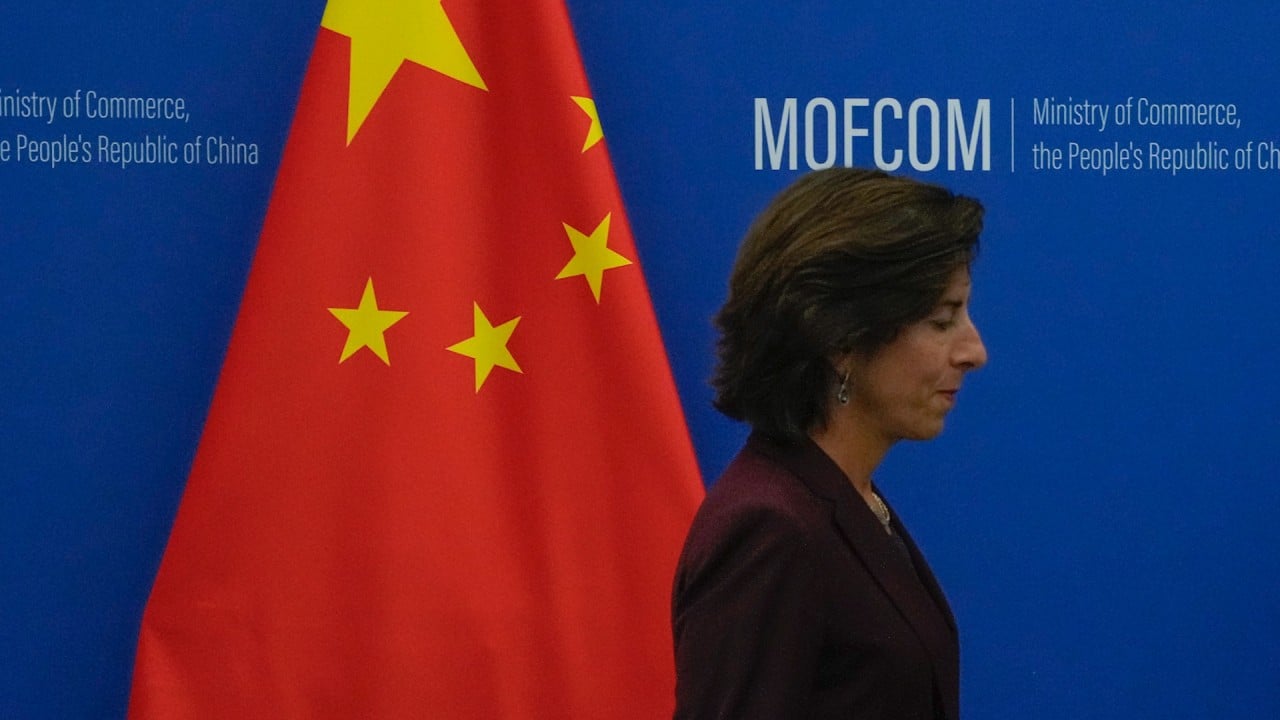
US-China trade: market sees clouds clearing for Boeing after Raimondo visit elevates hope of an order frenzy
- US Commerce Secretary Gina Raimondo made a point of wrapping up her four-day China visit with a press conference at Boeing’s maintenance hangar in Shanghai
- But with geopolitics playing a role in Boeing’s fate, any concessions by China may have to wait for future high-level exchanges, if history is any indication
A bridge-building effort between Beijing and Washington this week to curb mutual commercial concerns has raised market hopes that Chinese airlines might order more American-made Boeing aircraft after shying away amid bilateral tensions in recent years.
The expectations got a shot in the arm as US Commerce Secretary Gina Raimondo – who called Boeing an “iconic American company” and wrapped up her four-day China trip at the aircraft maker’s maintenance hangar in Shanghai on Wednesday – discussed “space commerce” with Vice-Premier He Lifeng while exploring possibilities for economic cooperation.
Meanwhile, from a technical standpoint, analysts say new supplies are undoubtedly needed to maintain the operations and the safety of the Chinese fleet, which comprised 46.9 per cent Boeing planes, with 51.5 from European rival Airbus, as of late 2021.
Chinese airlines will need more planes from the second half of 2024, as post-pandemic recovery picks up, according to John Grant, senior analyst with the British aviation intelligence firm OAG.
‘Important beginning’ as Raimondo ends China trip at Boeing, Disneyland
Boeing could be in line for more China orders at that point, he said. The company forecast last year that China, the world’s second-largest civil aviation market, would need 8,485 new passenger planes by 2041.
“You have to join the queue for new aircraft in a very strong market with places such as India, Indonesia and Saudi Arabia placing large orders this year,” Grant said. “Delivery dates are stretching out to the end of the decade, so China needs to reserve its positions.”
In another sign that Boeing’s jet deliveries to China could rise, Xiamen Airlines, a subsidiary of China Southern Airlines, said on Monday that it was opening up bids to leasing companies to fund four new 737 MAX-8 jets that it needs for this year. When contacted by the post, a Xiamen Airlines spokesman would only confirm that it had been made in the carrier’s WeChat procurement channel.
Analysts say China-US trade, tech and geopolitical disputes over the past six years have hurt Boeing’s China business. And any order of planes now would represent a “change in stance from both sides, and perhaps an easing of tensions”, Grant said.
During the pandemic, Chinese airlines expanded their fleets mainly on orders to Airbus, according to fleet data from the Cirium Ascend consultancy. The number of widebody passenger jets acquired by China rose by 26 per cent from 2018 through mid-2023, the data showed.
The contribution to China’s fleet from Boeing’s 737 MAX 8 and 787-9 were relatively marginal over the same period.
“We continue to support our customers in China, with more than 95 per cent of their current 737 MAX fleet in service. For deliveries, we will be ready to deliver for our customers when that time comes,” Boeing said in a statement to the Post earlier this week.
Does Airbus have the edge over Boeing in China’s aviation market?
Boeing, with a 50-year history of doing business in China, “looks forward to a continued working relationship for years to come”, a company spokeswoman also said on Wednesday.
“Delivery of Boeing planes to China will continue to have significance. But, and this is a big but, gone are the days when ‘what’s good for Boeing is good for America’,” said Zha Daojiong, a professor of international political economy at Peking University.
“737 MAX deliveries or new orders are unlikely to have much, if any, dent on US government policy orientation towards China any time soon,” Zha said.
“This is not to say that China should treat acceptance of Boeing planes as a matter of diplomacy,” he added. “As said, there is no added advantage or disadvantage of any sort. Rather, China should make decisions on it purely based on what’s rationale and sensible for its aviation market.”
The MAX is already back in the skies, and there’s no more reason not to move on
Only Boeing and Airbus can supply the “big” orders that China will need in a few years, said Eric Lin, head of China Research at UBS Securities in Hong Kong. “The MAX is already back in the skies, and there’s no more reason not to move on,” Lin said.
China might still consider placing a Boeing order at this point as a “small concession to get a larger one” said Alexander Vuving, a professor at the Daniel K. Inouye Asia-Pacific Centre for Security Studies in Hawaii.
“China is still an indispensable market,” Vuving said. “Everyone wants to get to China.”
The multibillion-dollar orders that China placed to Boeing in 2011, 2015 and 2017 coincided with meetings between Chinese and American heads of state. President Xi Jinping has a chance in November to meet US President Joe Biden at the Asia Pacific Economic Cooperation dialogue.

Boeing CEO Dave Calhoun said in May that he was optimistic about Boeing restarting exports of 737 MAX jets to China, especially with Xi slated to visit the US later this year.
However, some analysts caution against expecting a deal right away.
A resumption of sales “needs some exchanges for both sides”, said Lu Xiang, a US-China relations expert at the Chinese Academy of Social Sciences.
“Boeing’s near-term future in China hinges much on a Beijing-Washington rapprochement, which appears unlikely any time soon,” said Shukor Yusof, founder of Singapore-based aviation consultancy Endau Analytics. “China seems content to drag deliveries of existing 737 orders, never mind placing new ones.”




